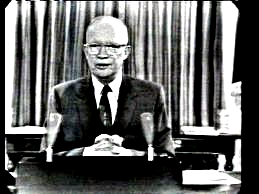
As Eisenhower noted in his farewell speech cautioning the nation about the rising power of the military-industrial complex (MIC), Americans are touched in many ways by the U.S. military. In the draft era, some were called to serve directly. In the voluntary service era, some chose to serve. Many more were affected by working as civil servants on military bases or defense laboratories, developed personnel or weapons systems, worked in VA hospitals and clinics. Still more were indirectly affected by the toll that war takes on a family.
In this sense, our family is no different. In World War I, DRU’s mother Ellen was a volunteer in the Navy nursing corps. Don Robert and his brothers John, Bill and Allan Underwood all served in World War II. Bill became a career officer in the Air Force. DRU’s first wife Billie was an Army nurse, and the two met when DRU was convalescing at a Van Nuys hospital from what was then called shell shock. Billie’s brother John served in the Navy during World War II, and brother Jay served as an officer in the Army, working in electronics. Mark’s first wife Kathleen worked in a Navy Personnel laboratory where Mark also later worked, and she continued to help military wives and family members when she became a clinical psychologist. Mark’s business ventures often entailed work that was sponsored by DARPA, Air Force or Army research initiatives, and he worked at several defense contract outfits (Visicom Labs, Applied Visions).
This is just a sampling of the military-industrial reach. Many family members have been omitted from this brief list. How families have been affected by such service is perhaps less well understood than the conversation about PTSD would indicate. For those who survive — and of course most do — it can be a steady, sometimes even rewarding career choice. For others, the frequent relocations can put a burden on families, especially women. The goal of military work — to deter and in necessary defeat by destroying what is today’s enemy — contains many paradoxes that not everyone has worked through.
There is little doubt that what became the MIC had a major impact on DRU and his family.